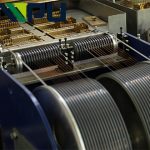Transformers play a pivotal role in the power transmission and distribution industry. They are primarily designed to convert high-voltage power to low-voltage power or vice versa. Two of the most commonly used materials for the wire in transformers are copper and aluminum. Each of these materials has its own unique set of characteristics that make it suitable for certain applications. In this article, we will compare and contrast copper and aluminum wires in terms of their properties, performance, cost, and environmental impact.
1. Physical and Electrical Properties
Copper
Copper is renowned for its excellent electrical conductivity. It has the highest electrical conductivity among commercial metals, and it’s only surpassed by silver. This means it can carry more current than aluminum for a given diameter of wire, resulting in more efficient power transmission. Copper also has a higher melting point and higher tensile strength, making it more durable and less likely to break or deform under stress.
Aluminum, on the other hand, has only 61% of the electrical conductivity of copper. However, it is lighter, with only about one-third the weight of copper. This makes it easier to handle and less expensive to transport. Moreover, aluminum is more flexible than copper, which can be an advantage in some installations.
2. Performance in Transformers
The performance of the transformer largely depends on the resistance of the wire, which directly impacts the efficiency and power loss of the transformer. Given its superior conductivity, copper wire tends to have lower resistance, which translates to higher efficiency and lower energy loss.
Aluminum wire transformers, however, can also be designed to match the performance of copper transformers by increasing the cross-sectional area of the aluminum wire. However, this can make the transformer larger and possibly more expensive.
3. Cost
Copper is generally more expensive than aluminum. The price difference can be significant, particularly for large transformers where a substantial amount of wire is needed. However, the higher efficiency and lower energy loss of copper transformers could offset the initial cost difference over the lifetime of the transformer.
Aluminum, being cheaper and lighter, can significantly reduce the initial cost of the transformer. However, the potential for increased energy loss and the need for a larger transformer size to match the performance of copper could increase operational costs over time.
4. Environmental Impact
From an environmental perspective, both copper and aluminum have pros and cons. Copper is more energy-intensive to mine and refine, but it is highly recyclable, and a significant proportion of the copper in use today is from recycled sources.
Aluminum is less energy-intensive to produce from bauxite than copper is to produce from its ores. However, recycling aluminum is more energy-intensive than recycling copper.
Conclusion
The choice between copper and aluminum wire in transformers depends on a variety of factors, including the specific requirements of the application, cost constraints, and environmental considerations. While copper’s superior conductivity and durability make it an excellent choice in terms of performance, aluminum’s lighter weight and lower cost may make it a more attractive option in certain situations.
It’s important to note that regardless of the material used, the design of the transformer is crucial. A well-designed transformer can minimize losses and maximize efficiency, whether it uses copper or aluminum wire.
LP Industry can produce magnet wires using in Transformers, motors etc. According to your requirement with best prices, check our website to learn more: https://transformer-wire.com





